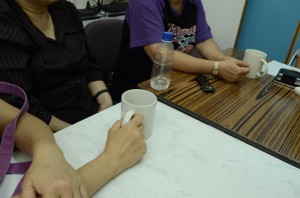Sexual harassment law protects customers from goods and service providers but not the other way round
By Vanessa Cheung and Natalie Tsoi
Leung is a 58-year-old worker in a care home. She has been doing this work for 18 years. One day, as she carried out her daily routine helping an elderly man with his shower, he stretched out his hands and tried to touch her breasts while she was towel-drying his body. Leung was shocked, she covered his body immediately to stop him attempting to touch her.
This may seem like a blatant case of sexual harassment but, under existing law, Leung cannot sue the elderly man. As a service provider, she can be sued but has no right to sue the service receiver for sexual harassment under the Sex Discrimination Ordinance (SDO).
“It is absolutely unfair…Why can you complain about me on sexual harassment but I cannot complain about you?” she asks.
The SDO was enacted in 1995 and is implemented by the Equal Opportunities Commission (EOC). Under the terms of the ordinance, “It is unlawful for a person to sexually harass another person in the course of offering to provide, or providing, goods, facilities or services to that other person.” But sexual harassment by customers and clients against service providers is not covered, leaving 3 million service providers outside the scope of the ordinance.
According to the EOC, sexual harassment occurs when any person makes unwelcome sexual advances, or unwelcome requests for sexual favours, to another person. Conduct of a sexual nature which is likely to offend, humiliate or intimidate another person or creates a hostile environment is also considered sexual harassment.
In 1999, the EOC proposed to amend the SDO by making it unlawful for a customer to sexually harass the service provider in the course of seeking, or receiving, goods and services. Although the government indicated it would not object to such an amendment in 2000, nothing happened until the EOC proposed it again in 2011.
And it was not until October this year, that the administration tentatively announced it would introduce the Sex Discrimination (Amendment) Bill to the Legislative Council by the second half of the current legislative session.
Human rights lawyer Chong Yiu-kwong believes one reason why it has taken so long is the lack of controversy over the issue, pushing it to the bottom of the government’s agenda. Since sexual harassment by customers against service providers is not covered by the SDO, the EOC cannot follow up on any complaints or maintain relevant statistics, and subsequently victims might not bother turning to the EOC. Therefore, there is a lack of data showing how serious the problem is and reflecting the necessity to amend the ordinance.
“Issues will never be prioritised if the government does not feel the pressure,” Chong says.
However, there is some evidence that the problem is widespread and there is a need to legislate. In October 2011, the Association for the Advancement of Feminism (AAF) published the “Survey on the Body Labouring of Young Women and the Sexual Harassment in Workplace”. (“Body labouring” is a term used to describe women whose work brings them into contact with the public and often leaves them vulnerable to sexual harassment) In the survey, AAF interviewed 203 women aged between 16 and 25 who were uniformed service providers such as flight attendants, beer promoters and waitresses. Nearly a third of the interviewees said that they had experienced sexual harassment by customers.
Without protection under the law, what non-governmental organisations can do to help is limited. “For other cases, we can make suggestions on how you can file a complaint to the EOC and what ordinances you can refer to in your complaint…we can accompany you to the EOC and follow up the case together, but we cannot do it in this situation,” says Jodie Hui Pui-lam, the AAF’s coordinating officer.

Without the help of the non-governmental organisations, victims may seek help from their employers. However, many companies do not provide clear guidelines on handling sexual harassment from customers.
Julian Yau Chi-hung, the external vice-chairman of the Cathay Pacific Airways Flight Attendants Union thinks that the guidelines for front-line employees on how they should handle incidences of sexual harassment from passengers are inadequate. “They only tell us you need to report to your supervisor or call the police, they do not mention if we should make a record of it or ask for a witness,” he says.
Jenny Ho Kit-man, an executive committee member of the union, thinks companies are not motivated to provide clearer guidelines because the ordinance does not cover employees. “[They think] there are no protections so why should I do anything? It wouldn’t help you anyway,” says Ho.
Even when there are guidelines, they do not apply to all work scenarios. When 20-year-old Louisa Chan Lok-yee faced sexual harassment during her nursing internship, she was frightened and at a loss as to what she should do. In school, Chan had learnt how to avoid complaints of sexual harassment from patients but she was not taught what to do if the tables were turned.
On the second day of Chan’s internship, she and her classmate were assigned to change the diapers of the male patients. A 50-year-old patient asked Chan to clean his genital area although he did not need to change his diaper. Chan resisted at the beginning but agreed after the patient’s repeated requests. As she did so, the patient had an erection. “We were frightened, we asked him if we had hurt him but he said ‘No, it feels good and please continue’ but we felt really embarrassed,” says Chan.
Chan reported the incident to her teacher at the school of nursing but the teacher neither took further action to assist her nor provided her with advice on how to handle similar cases.
If and when the amendment is passed, the possible terms for sexual harassment by a client could be a written or verbal apology, a transfer or re-employment of the employee, and financial compensation. With a law in place, employees may request that companies draw up better equality policies and guidelines against sexual harassment.
However, an amendment should not be seen as a “cure-all” for the problem of sexual harassment in the workplace. Even with the existing law protecting customers from sexual harassment against service providers, the EOC has received a total of 33 related complaints over the past five years. After investigation, 22 cases were dropped, one was resolved and conciliation was achieved in six cases. In the four cases where conciliation was unsuccessful, the complainants had the option of filing a civil suit, but this did not happen. In other words, none of the cases have been brought to court.
Women’s groups believe this has as much to do with education and culture as anything else. In “A Survey on Hong Kong Women’s Experience of Sexual Violence 2013” published by the Hong Kong Women’s Coalition on Equal Opportunities, more than half of the interviewees said they did not react when they faced sexual harassment.
Chau, who is in her forties and has worked as a product promoter for 10 years, says she keeps her discomfort to herself when she experiences sexual harassment. She recalls an incident when she was working in a supermarket and her counter was close to the fish stall. When there was a leakage of water from the refrigeration unit, a male member of staff said to the promoters, “You’re gushing from below.”
Chau felt embarrassed and uncomfortable but she did not see a need to complain, “What I mean by unnecessary [to complain] is that I don’t want to blow up the problem,” says Chau.
Zenneth Ng Cheuk-ling, an organiser from the Hong Kong Women’s Work Association, says many victims respond in the same way as Chau when they encounter sexual harassment. “People want to hide anything relating to sex…they think it is shameful and do not know how to talk about it,” says Ng. She thinks the EOC should provide more sex education to increase public awareness.
But it is not just embarrassment or shame that is preventing victims from reporting cases of harassment. Ng says they fear they will be sacked if they file a complaint. In the case of product promoters, the supermarket can call the product suppliers to terminate the service of a product promoter without giving any reason. The product suppliers will usually do as the supermarket requests since they rely on them to sell their products.
Ng’s observation shows that a company’s attitude in dealing with complaints greatly affects how employees respond to and handle incidences of sexual harassment. However, most companies lack awareness of the issue of sexual harassment. An EOC survey entitled “Sexual Harassment – Questionnaire Survey for Business Sector” published in August found that only 3 per cent of the companies approached even bothered to respond to the survey. Among the respondents, only 57 per cent had adopted a policy statement on sexual harassment.
Ellen Cheng Lai-yee, the chairman of Hong Kong Disneyland Cast Member’s Union, says the amended ordinance will only be effective if companies provide information to assist employees on handling sexual harassment. “The company and the employee, also the labour union should work together after the SDO is amended. The company should clarify how to handle the cases and help the victims when sexual harassment really happens. Females maybe very reluctant to express themselves on this issue,” Cheng says.
Indeed, by sweeping the problem under the carpet for so long, Hong Kong society has become numb to the humiliation of sexual harassment that workers experience on a daily basis – including the victims themselves. “Working in the service industry, I am used to this kind of sexual harassment,” says Yuet, a supermarket product promoter. “There is just too much of it.”
Edited by Amy Leung











































